6 Ways Sustainability is Shaping the Future of Events
Kortney Phillips
Apr 20, 2023 12:01:51 PM
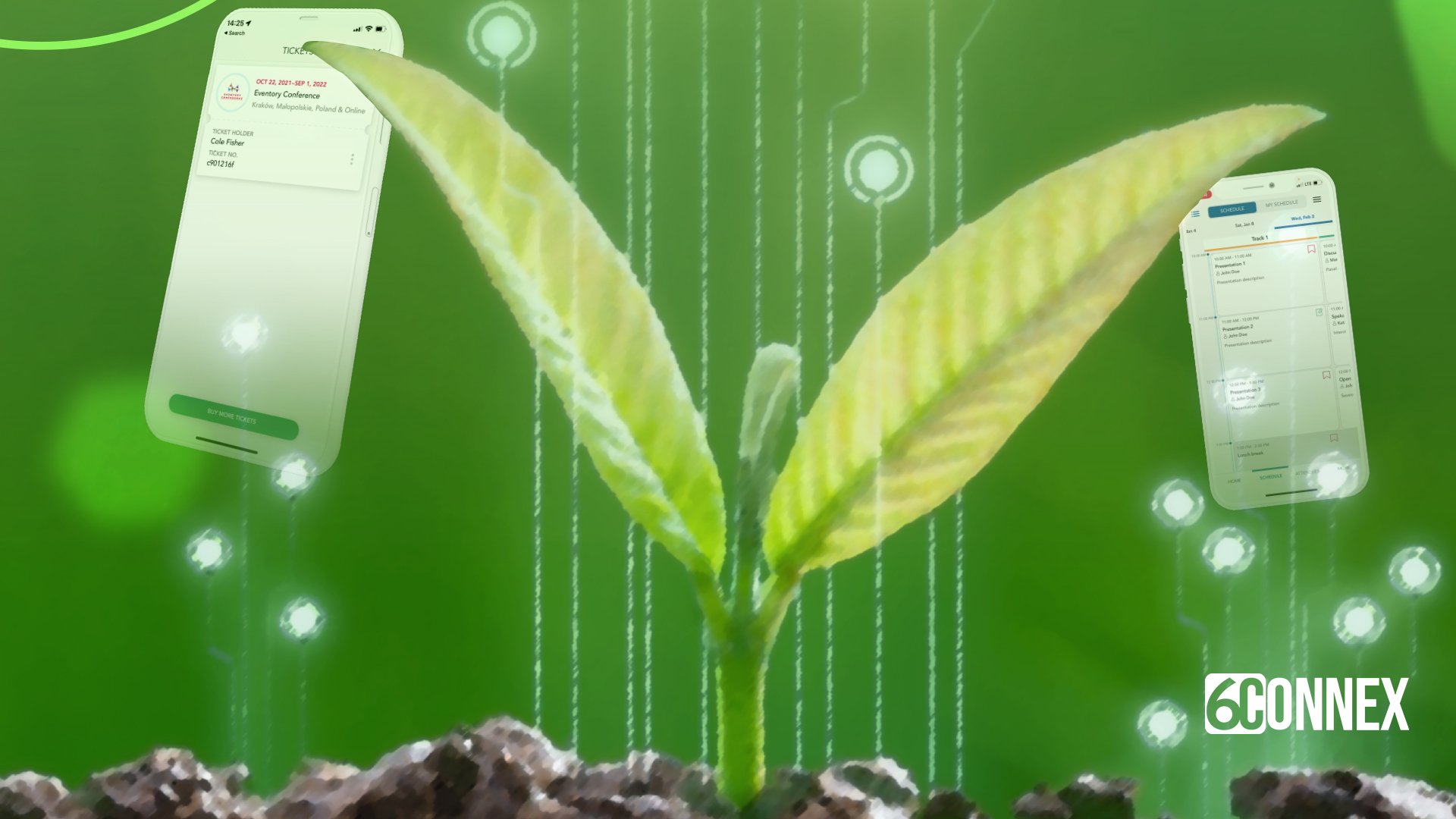
The event industry has seen a resurgence in in-person trade shows, job fairs, networking events, and more in 2022, which is good news for marketers as they can once again access this primary source of leads. However, the growth of the events industry has come at a cost, with concerns arising about sustainability management, resource sharing, waste management, and over-exploitation. Which leads to the question, why is sustainability important in events? Many materials used at events, including exhibition structures, booths, and packaging materials, are left behind as trash. Transportation to and from events accounts for a significant portion of carbon emissions, too.
As the event industry has become more aware of these negative impacts, event organizers are increasingly required to take a critical approach to sustainability and climate action. Some industry professionals are already taking steps towards decreasing waste and increasing efficiency, such as reducing food and energy waste, partnering with greener venues and energy service providers, using eco-friendly products, and adopting greener technologies. To gain ground toward imperative sustainability goals, 6Connex recently interviewed thought leaders in the sustainability industry to learn more about their work. Their efforts will be instrumental to the success of the industry as a whole.
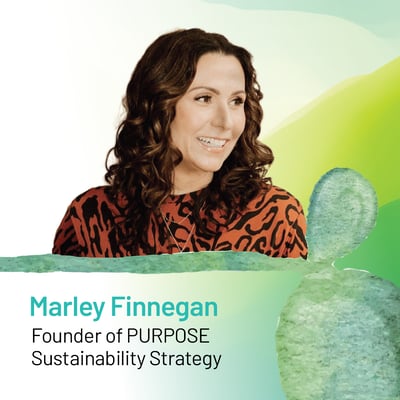
Marley is a sustainable hospitality consultant, and her company, PURPOSE Sustainability Strategy (PSS), focuses on sustainability solutions for the events industry. Her expertise in that area led her to develop a climate technology called PURPOSE NET ZERO (PNZ), which manages the largest emissions factor of live events by way of measuring + providing actionable carbon impacts in accordance with the attendee travel journey. Essentially, PNZ calculates the carbon footprint of attendees traveling to business events. Further, PSS provides sustainable solutions for corporations, venues, and vendors, including environmentally conscious culinary, food donation programming, and waste diversion expertise.
Marley stresses the importance of measuring baseline emissions to identify the biggest impact areas and then make necessary changes, noting, "You can't manage what you can't measure." Marley warns that publicly owned companies in the U.S. will likely be mandated in the coming years to disclose their business-related supply chain emissions, including events. She recommends implementing measurement and reporting practices now to prepare for this possibility.
Marley also highlights that travel typically accounts for 70-90% of event-related emissions, followed by energy consumption, sourcing practices, and food waste. To address travel emissions, she suggests using tools like PURPOSE NET ZERO to calculate and offset attendees' carbon footprints. She also recommends looking for venues with consistent and established recycling programs and green energy solutions, though she acknowledges that inventory can be limited. Marley further advises event planners to scrutinize catering options, pointing out that serving all vegetarian menus or even wild-caught fish over beef can significantly reduce CO2 emissions while sourcing food within a 250-mile radius of the event location also has a meaningful impact. Finally, she suggests digitizing the event experience as much as possible to minimize waste.
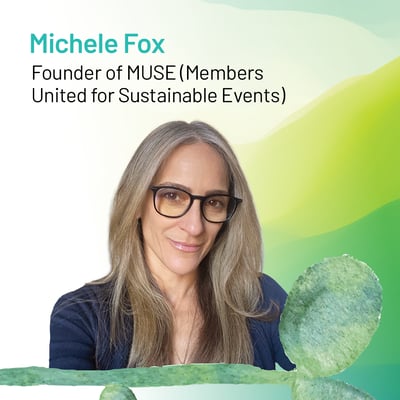
Michele, an event producer and environmental activist, founded MUSE, a membership organization that aims to provide leadership for sustainable event management through inspiration, education, and community building. She holds a Certificate of Corporate Responsibility from NYU’s Stern School of Business and merges her passion for people and the planet at MUSE, helping inform professionals seeking information on sustainable best practices and providing a directory of 500 + sustainable suppliers and other resources.
For event planners, taking the first step toward sustainability can seem daunting. However, Michele suggests it’s important to simply acknowledge most people are new to sustainability and are all starting at a similar place.
Michele advises event planners to talk to vendors and suppliers. Often, event planners will be surprised by the availability of sustainable options and vendors’ willingness to make changes when asked. For example, Michele once asked a catering company to switch from plastic to ceramic platters, and the change was made immediately.
Michele also reminds event planners not to underestimate these easy wins. Small steps may seem insignificant, but quick wins can build momentum, and they create a baseline strategy that paves the way for more significant changes in the future. Once event planners have more experience, they can include sustainability language in RFPs and make more informed vendor decisions.

Mercedes Hunt is the Director of Energy and Sustainability at Marriott International. Her primary responsibility is to support Marriott's Serve 360 sustainability goals, which aim to decrease water intensity by 15%, landfill waste by 45%, and food waste by 50% by 2025. In addition to her role at Marriott, Mercedes serves on the board of the Sustainable Event Alliance (SEA) and has conducted research in collaboration with the International Association of Venue Managers (IAVM).
When it comes to migrating event strategies towards sustainability, Mercedes suggests starting small when becoming environmentally friendly. She notes that sustainable event planning doesn't necessarily require a lot of money. Rather, it comes down to conscious decision-making. For instance, she recommends opting for vegetarian, chicken, or fish options instead of beef when finalizing the catering menu and choosing locally sourced plants and flowers for décor. She advises, “There’s no need to recreate the wheel with so many amazing resources at your fingertips.”
Mercedes also notes that adopting sustainable practices can become addictive as small steps lead to larger strides. She notes that once event planners start making sustainable decisions, they become more aware of their choices, creating a snowball effect.
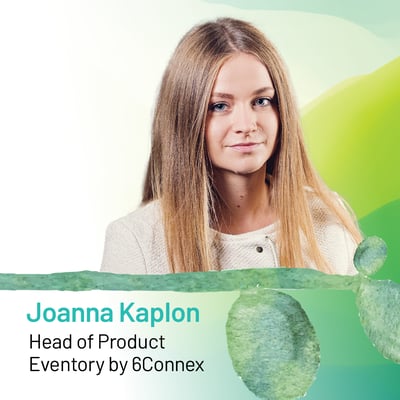
Joanna Kaplon is the Head of Product for Eventory by 6Connex, an all-in-one event management tool that simplifies the event experience for everyone involved, including organizers, exhibitors, partners, sponsors, and attendees. By digitizing different aspects of the event, such as badging, agendas, business cards, and attendee surveys, Eventory makes it easy for event hosts to introduce virtual elements into in-person events, reducing the events’ environmental impact.
Joanna suggests that by leveraging event technology and mobile apps, event organizers can minimize their environmental footprint by eliminating negatively impactful practices. For instance, Eventory by 6Connex offers multiple mobile app solutions that eradicate the need for printed materials such as agendas, brochures, venue maps, and promotional collateral. These apps also replace traditional, paper-heavy in-person registration and ticketing practices with digital alternatives that allow attendees to access event badges, business cards, drink tickets, and other materials through their smartphones. By reducing the need for paper, plastic ID supplies, lanyards, and other physical materials, this approach offers a more sustainable alternative for event planning, especially for large-scale events.
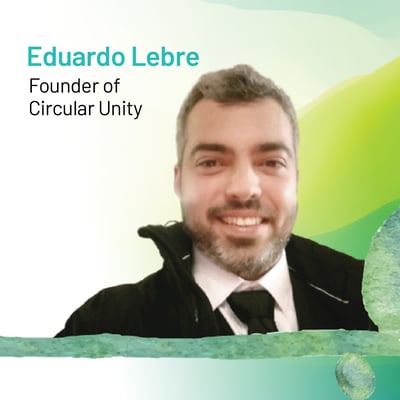
Eduardo Lebre is one of the founders of Circular Unity, an organization committed to fighting climate change by empowering events, sports, hospitality, tourism, and entertainment organizations with technology to comply with Sustainable Development Goals (SDGs) and the Paris Agreement and to become carbon neutral. Circular Unity's impactALL solution is a groundbreaking tool that automates data collection, analyzes sustainability, measures, and reports carbon footprints, and enables event organizers to take action to reduce their environmental impact.
Sustainability isn't just good for the planet. It's good for business too. Eduardo points out that by adopting sustainable business practices, companies can save money, improve brand reputation, and even access new markets. And Eduardo’s not alone in his thinking. According to a study by NTT, more than 44% of the companies surveyed saw an increase in profit due to the sustainability programs they implemented. Furthermore, 33% saw a reduction in their operating costs.
Eduardo notes that when it comes to sustainable event practices, from the very beginning, all event stakeholders, from planners to speakers, to attendees, have a social responsibility and need to adopt a sustainable mindset. He believes one of the best ways to do this is to start measuring the impact of events. By tracking your progress, you’ll have metrics to compare year after year and can continuously improve your sustainability initiatives. You can even integrate sustainability into your financial reporting and investment strategies by measuring and disclosing your carbon footprint and engaging with investors on sustainability issues.
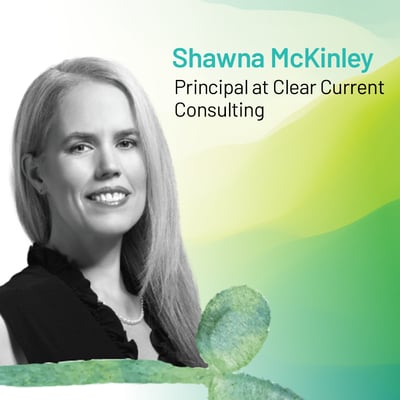
Shawna McKinley is a true sustainability expert with more than two decades of experience in teaching, writing, and consulting on sustainable event planning events and travel. She's worked with some of the world’s most well-recognized brands, including Fortune 500 companies, helping them develop sustainable event strategies. She also teaches sustainable event management and ethics at the British Columbia Institute of Technology in Vancouver, Canada.
Over the course of 10 years, Shawna has learned valuable lessons on the path to decarbonizing conferences. Although she acknowledges that each event has its own set of unique challenges, she believes these lessons can be helpful for others striving to achieve net zero.
Lesson one: Virtual event technology can yield a net reduction in the attendee transportation footprint.
Lesson two: Choosing a destination, venue, and hotel with lower carbon intensity can reduce emissions.
Lesson three: Serving plant-based meals reduces onsite emissions.
Lesson four: Shifting to more sustainable production materials can significantly reduce the carbon impact, especially for events featuring multiple exhibitors.
Lesson five: Virtual events have fewer environmental impacts than in-person events, but pre-recorded content and shipping can add carbon emissions. The storage and sharing of event-generated content can also have ongoing environmental impacts that need to be measured.
Lesson six: A single-site, hybrid model for events may not be the most effective way to reduce emissions. Instead, opt for a regional cluster conference model.
Lesson seven: Carbon offsets that support nature-based solutions take a long time to be fully effective in absorbing emissions, sometimes requiring decades. Using them as a way to delay harder choices to reduce can cause more harm as emissions continue to accumulate in the atmosphere.
Lesson eight: Events can have a positive impact on the environment beyond just reducing their own emissions. By inspiring and encouraging participants to take action on climate change, events can create a legacy of net zero pathways.
6Connex knows that sustainability is becoming an increasingly important aspect of event planning as concerns over their environmental impact grow. While the events industry is thriving, it is essential to consider the cost to the planet and understand why sustainability is important in events. The good news is that event organizers are taking steps towards sustainability, from reducing waste to partnering with greener venues and energy providers.
Get ready to be inspired by the incredible ways in which these pioneers are changing the game! Schedule a consultation with 6Connex to see how.
Join us on June 27th at 10 a.m. CST for our webinar "Raising the Bar: Achieving Sustainable Events through Innovative Technologies and Expert Insights." co-hosted with MUSE. Learn from event sustainability gurus as they share tips on reducing carbon footprints and creating events that make Mother Nature proud. Don't miss out on this industry leading, eco-friendly event! Register below.
6Connex is the leading provider of in-person, hybrid, and virtual event technology for enterprises worldwide. Our cloud-based product portfolio includes event management tools, in-person event apps, virtual venues, webinars, learning management, and more.
From internal meetings to large scale conferences, we allow you to engage and transform big ideas into real-world results.
425 Soledad St.
Suite #500
San Antonio, TX 78205
1.800.395.4702
Australia: +61.2.72294013
Brazil: +55.11.4375.3555
United Kingdom: +44.20.37447284
United States: +1.210.890.5769